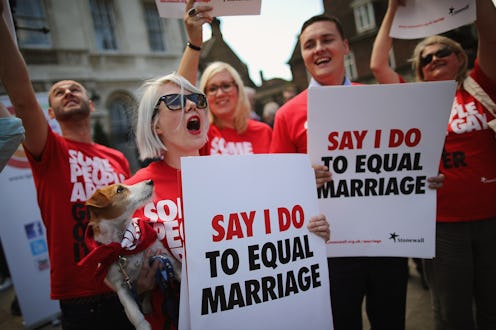News
Gay Marriage One Signature Away From Law In...
Last week, Hawaii was poised to become the fifteenth state to legalize gay marriage. Then, Illinois passed gay marriage legislation, and it looked like it would be number fifteen. But on Tuesday, Hawaii leapt back into the lead, with the state Senate finally passing House legislation to legalize marriage equality and sending it straight to the desk of Governor Neil Abercrombie. Regardless of which state becomes the first to formalize the law, the fact is that by the end of November, two more states will offer everyone the social recognition and legal benefits of marriage.
Tuesday was the second time the Hawaii state Senate approved the bill, as an earlier version was subsequently amended by the House of Representatives and thus needed to be passed again in the upper chamber. The House’s modifications included a delay in the effective date of the legislation (they’ll start on December 2nd), an expansion of exemptions for religious organizations, and the removal of language regulating how children of gay couples can claim Native Hawaiian benefits. The Senate passed the House version as-is, so all that’s needed for the bill to become law is the signature of Governor Neil Abercrombie, an outspoken advocate of marriage equality.
In last week’s House vote, Rep. Jo Jordan became the first openly gay legislator to vote against gay marriage legislation. She says that she did so because she didn’t think the bill’s religious exemptions were sufficiently “bulletproof” to withstand court challenges down the line; Jordan also cited other concerns with the bill, yet her explanation of those concerns was largely incomprehensible. Go ahead, read the interview, and see if you can figure out what she’s talking about.
Hawaii’s passage of the bill has a special significance, as in many ways, it’s the birthplace of the national debate over gay marriage. As Bustle reported last week:
In 1993, when no states recognized marriage equality, the Hawaii Supreme Court struck down a state ban on same-sex marriage. It was heralded at the time as a leap forward for civil rights, with the New York Times calling it a “step toward legalized gay marriage.” Instead, though, it gave birth to a conservative backlash against marriage equality in the state, paving the way for the Defense of Marriage Act in 1996 and a constitutional amendment in Hawaii banning same-sex marriage in 1998.
In addition to the whole equality thing, Hawaii also has a financial incentive to legalize gay marriage: As a premier wedding and honeymoon destination, allowing gay marriage ceremonies to take place on the islands would bring in boat loads of money for the state. A researcher at the University of Hawaii figured that same-sex couples will spend around $166 million in Hawaii over the next three years on marriages once the legislation takes effect, and that the additional tourism revenue will reach $217 million.
